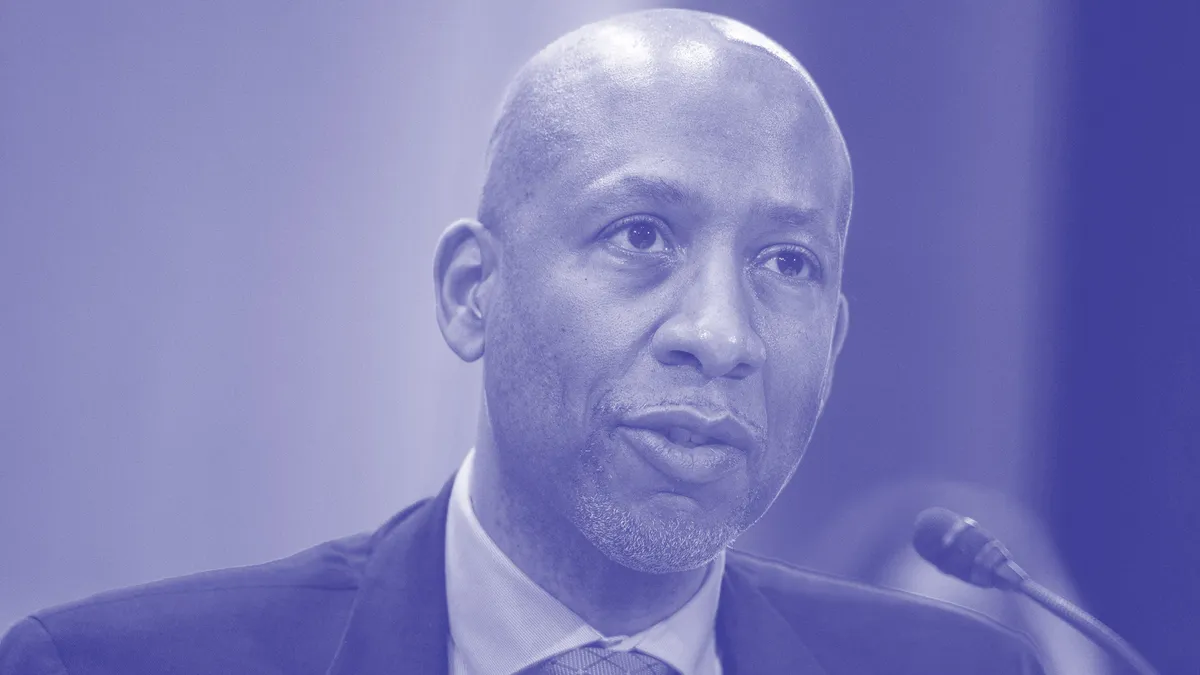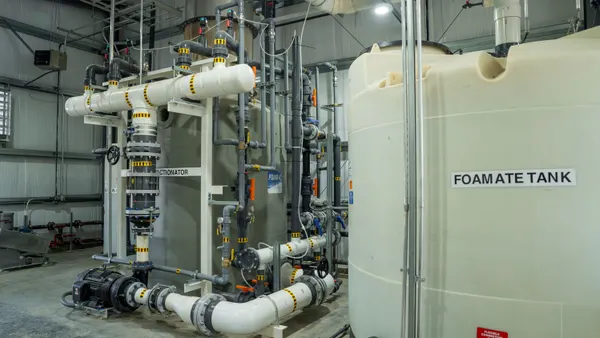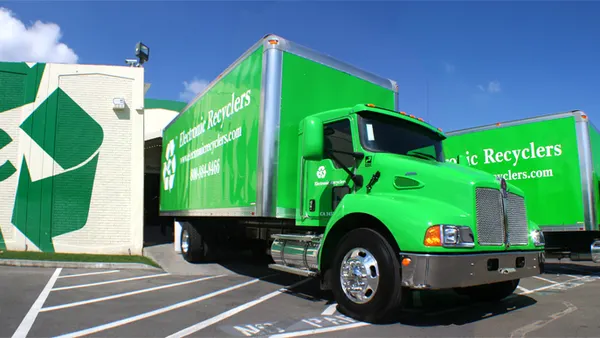In 2020, New Jersey passed what many in the waste industry consider the country’s most notable environmental justice law. It requires certain operators to consider the environmental justice impacts on nearby communities when applying to expand a facility, construct a new one or renew permit authorization. Matthew Karmel, an environmental attorney with Riker Danzig, has worked with New Jersey companies to help them understand their responsibilities under the new law and navigate complexities of both it and other environmental justice laws and policies.
On Monday, the New Jersey Department of Environmental Protection took a notable step toward implementing the law by issuing a draft of the proposed final rule. After NJDEP holds a series of public hearings, set for July, the state could adopt the final rule by the end of this year. Among its requirements, the proposed rule states that permit applicants are expected to offer "meaningful engagement" in their plans for expansion, new facilities, or renewals. This includes hosting a public hearing, opening a public comment period of at least 60 days and providing an environmental justice impact statement assessing any new environmental or public health impacts the facility could pose to “overburdened communities.”
The law is meant to protect the state’s “low-income communities and communities of color, [who] historically have been subjected to a disproportionately high number of environmental and public health stressors,” according to NJDEP.
The waste and recycling industry in New Jersey — and across the country — has taken note of the law’s requirements, which other states could use as a blueprint for their own laws and regulations on mandatory compliance components in the future.
Waste Dive talked with Karmel on two occasions about what the new law might look like for waste and recycling operators, how operators in any state can create their own risk assessments to get a better picture of their environmental impact through an environmental justice lens and where environmental justice shows up in the industry beyond regulatory compliance.
These interviews have been edited together for length and clarity.
You’re an environmental lawyer in New Jersey, a state that is pretty well known for enacting some strict environmental justice rules for permitting and other actions. What’s the latest in terms of the state regulations and when and how folks will need to comply with the new law?
The law was passed in 2020 but none of the requirements are effective until regulations are adopted. Regulations have not been adopted. What the New Jersey DEP has done [in the meantime] is issue an administrative order, saying they’re going to do certain things under their existing authority before those regulations come in. That means incorporating some of the public participation aspects of the law, such as [requiring] public hearings and public comment periods for anyone who would have been subject under the regulations of the law until we get those regulations enacted. They also included language saying they were going to consider additional substantive items, like permit conditions or permit denials, where appropriate under their existing authority. So DEP has had a lot of existing authority, and they're going to use it in that way.
There have already been a couple people who have gone through the public hearing process on their way to permit renewals or new permits under New Jersey's law. We're starting to see the process unfold. I don’t think we’ve seen a significant substantive impact on any projects yet, but we're seeing this public participation process happening.
We are not at a point yet in the regulatory process where it is easy to communicate nuance in a regulatory discussion that involves EJ. There's a lot of significant concern. As an example, New Jersey has guidance that was issued to the solid waste industry where new permits — even before this new EJ law — had to go through some additional public participation. It was minimal, an extra hearing. But after New Jersey came out with its new EJ law, that same guidance was applied really conservatively and restrictively by local governments [to the degree that] regulators did not want to even touch a project until the EJ process had completed. On one hand, it’s good practice, because [as a regulator,] you don't want to make a decision before the process goes through. But now we’re seeing EJ as a limiter on normal regulatory discretion, at least at this point.
Regulators are concerned where EJ is involved and erring on the side of caution, not even necessarily erring on the side of protecting EJ communities, though I think that could be an outcome of what they're doing. It’s more that they’re erring on the side of strictly following EJ procedures because those have been the ones that are determined [by regulations] to protect communities. However, in some instances, the community actually is in favor a project, and [the applicants] just haven't finished checking all the boxes. I don't think that we're in a place yet where regulators are comfortable making exceptions or doing things differently in an EJ framework, even when EJ considerations favor doing that.
Part of what the industry wanted to see in the DEP’s draft final rule, issued on Monday, was more clarity on how companies will need to comply with the law when renewing certain permits or applying for new ones. What details jump out at you that could clear up some confusion, and what areas are still murky?
I think the question of when solid waste facilities have to go through the process is still a little ambiguous. It applies on renewal of Title V permits, for example — any solid waste facility or waste management facility with a Title V permit is going to be subject. But then you get into the facilities and expansions. It is pretty easy to know whether you have a new facility, right? But a significant change in use could also count as a new facility. So, for example, if you had one type of solid waste facility, and you're switching to a totally different type of solid waste facility. I don't think we know exactly how that's going to play out.
The DEP has signaled that they're also going to define “expansion” very broadly to any change that increases the stressor profile of the facility. So if you are increasing your facility footprint, that's probably an expansion. If you were operating on a site that was mostly permeable, and you're paving the whole thing, that might be an increase in an environmental stressor [due to how it might change stormwater runoff or other factors], and that might qualify as an expansion.
Another question, and I don’t think we have the full answer, is, is there a change in your process that requires a change in a permit and also, at the same time, increases emissions? Let's say you switch out an engine on a piece of equipment, and that equipment now has more emissions. I think that's an expansion under the definition. Facilities should almost assume that if they have a permit modification, the burden is going to be on them to prove that there is no increase in emissions.
One of the things that people were really concerned about was the conditions that can be imposed where there are air emissions subject to a control device. As I read the regulations, there's a rigorous process to go through to figure out what control devices have to be used for certain conditions.
For [permit] expansions and renewals, the department previously had discretion about whether to impose conditions if the facility was going to have a disproportionate impact [on a community]. We were expecting this to remain flexible [in the final rule] — for the department to be able to decide, "OK, for this expansion, we are going to impose a condition, but in this other one, we're not going to impose a condition." But now the department is obligating itself to impose conditions in those instances where it could have had discretion under the statute.
Where do the fenceline communities come into this process, and what more is needed beyond just one change in the law?
I think that this [law] is a very powerful tool for environmental justice communities to have a strong voice and say in what’s sited and permitted in their communities.
I think New Jersey is doing that in broader climate discussions, too — saying, “we’re going to put more restrictive regulations on industry, but also, let’s generally rethink regulations, how can we do things differently?” Because it's important to remember that there's carrots and sticks, and we shouldn't just be using sticks. We should be using carrots. And when I say that, I don't really mean incentives, even though that's an option, such as the Justice 40 initiative from the federal government. Grants and incentives are great things, but so is simply supporting important projects.
I do a lot of work on the New Jersey Composting Council and food rescue. One of my personal passions is trying to get regulations changed in New Jersey to allow community gardens in environmental justice communities to conduct additional composting without cost-prohibitive permits. Currently, they would need a commercial permit. I've been working with nonprofits for the last couple of years to get those regulations changed.
I'm sure there are a dozen, a hundred other ways for states to do something similar, to just ask, what does an EJ community need? What are they already doing? How can we give them the things that they don't otherwise have?
What lessons do you think the industry needs to learn as they get more comfortable thinking about, talking about, and acting with an environmental justice lens? Both from the facility side and from a development perspective?
There are lots of other ways where environmental justice comes up [beyond permits]. I've been involved in M&A transactions where environmental justice has been an issue — something to look for when you’re doing due diligence and trying to understand how an EJ law is going to apply, and how the facility is going to be regulated going forward. In M&A transactions, EJ risk is going to start being evaluated as one of the elements.
Let's say a company wanted to buy a small waste hauler in New Jersey, or a small recycling facility. When they go to draft up the M&A agreements and are doing their due diligence, they see there are a series of water violations where there's been pollutants discharged to a water body used by an environmental justice community. You've got a general environmental risk, and you’ve also got an overlay of EJ risk.
Some facilities can be really proactive, both about complying with EJ diligence when they're not subject to a law, and then also when there's uncertainty in applicability, to try and go above and beyond. We’ve seen companies that know they’re going to be entering into an M&A phase where they might be acquired and they want to put themselves in a position of having a clean bill of health. So they’re going to take certain proactive steps so they can reduce whatever uncertainty there is regarding EJ.
Are there any resources that you would recommend for folks that are trying to take that proactive approach and assess what EJ impacts their facilities might have?
This is all kind of a bespoke process right now. What that could look like is maybe conducting a risk assessment. There's a whole bunch of different factors that you can look at. How close are you to an EJ community? What's the life cycle of this project? How much capital investment are you going to have to do to expand it? Is this facility going to change use? You can think about these things if you're in an M&A transaction, or if you're just in an operation scenario.
Proximity of the facility to an EJ community is important. You can look it up with the EPA’s EJScreen tool, or use your state’s specific tool. You can also work with a consultant to determine how close you are to EJ communities based on what the law is in your state. Is there a history of enforcement against facilities in EJ areas? Look at the demographics of the community, as well as the history of engagement between your community and the regulator, and your community and your facility.
It's still a flexible concept, but it just gets you thinking along the right lines. This will also help companies think about these things so they can talk about them in public hearings. I don't think that many companies know how to hold public hearings yet. Regardless of whether they're in a state that has EJ laws or doesn’t, EJ risk is going to be a part of their future business.
















